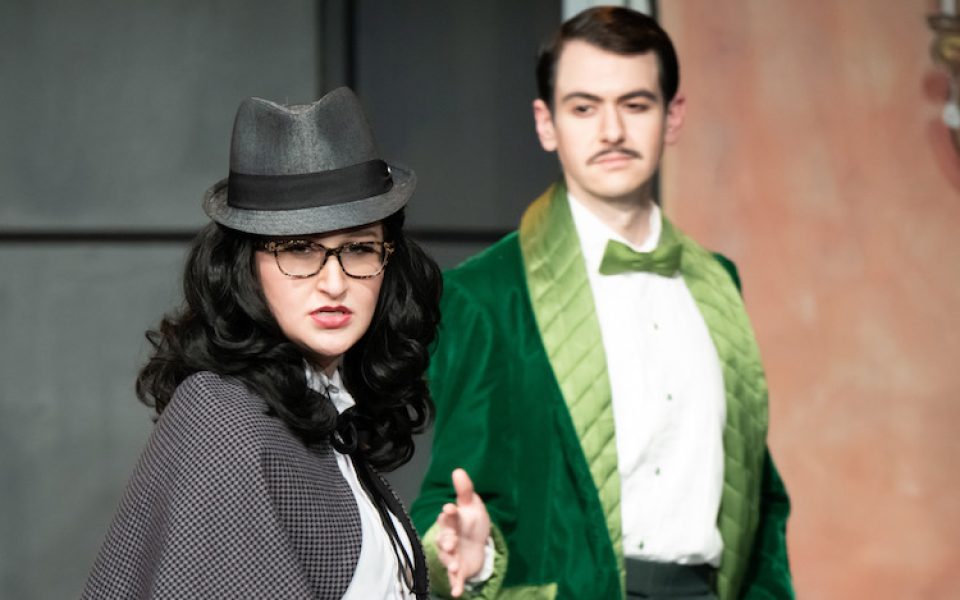“The premise of the game is simple,” Mr. Boddy says.
The tuxedoed man saunters around the stage while explaining the rules for the evening. He stops center stage, looking from person to person.
“Kill me,” he says, “with one weapon, in one room.”
From the opening of the first act, the cast for the Community Theatre of Greensboro’s production of Clue: The Musical breaks the fourth wall of the cardboard box.
On Friday night, the Starr Theatre morphs into Boddy Manor, its floor and back wall covered in square tiles, as Director Bobby Bodford aims to place the familiar Parker Brothers mystery on a life-size scale.
“If I could make you feel like you were watching an oversized board game being played,” Bodford says, “Then we were a good ways there.”
The scenes seem more likely to happen around a dining room table with miniature pewter weapons and playing cards, rather than in a musical that pulls from all types of Broadway tradition.
Mr. Boddy sits beside a two-foot die, in a painted room marked “Library.” He moves plastic tokens on top of his makeshift table as he invites three audience members onto the stage. A pair of musicians play out a piano instrumental as a young boy approaches the soon-to-be murder victim. Mr. Boddy offers a set of six cards, asking the child to choose who tonight’s killer will be. The small boy hesitantly reaches out.
“Oh no, not that one!” Mr. Boddy retracts the cards. “Let me shuffle these!”
With a total of 216 possible endings giving each show a different outcome, the production stays grounded within the original game. Director Bodford mentioned going so far as to use the board for the initial blocking. He counted how the plastic pieces moved and recreated it with the cast.
“They have to sorta be two-dimensional,” Bodford said of the characters, “in some odd kind of way.”
With only a moment’s notice, actors alter their lines and props as the final reveal switches between Mr. Green in the conservatory with the lead pipe to Colonel Mustard in the lounge with the revolver — or another of the hundreds of options.
The characters walk within the squares, as if guided by invisible hands. They pass in front of enormous room cards and a painted front of the box they live within. Mrs. White tenderizes a roast using a lead pipe, and Ms. Peacock names off her dead husbands in a song.
Mr. Boddy interrupts each scene, pointing out hints towards the answer for the “whodunit.” The house lights flicker on for a few brief moments. The audience moves their attention from the stage to the back of the program, where they scribble down notes and mark out eliminated answer choices using a form provided by the theater.
The band of likely killers joke about their constant game of murder, singing out the weapons. They list off, “wrench, candlestick, knife, pipe, revolver, rope,” filling the intimate theater with their rhythmic chanting.
Mr. Boddy’s ghost, satisfied with his death, returns wearing white to show the audience the answer. For tonight, the victim met his demise at the hands of his housekeeper, Mrs. White, with the revolver in the billiard room. A handful of audience members stand, holding up their programs high with the correct answer, but thanks to a final twist, the last scene holds an extra mystery.
The characters delight over being free from Boddy Manor, but then the opening song begins to repeat. Each token takes their place on their podiums, and exit one-by-one until only Mr. Boddy remains. He removes the top of the box from the backdrop, and carries it over to the door, shutting it.
He closes the box, and resets the game.
Clue: The Musical runs at the Community Theatre of Greensboro through Sunday. For showtimes and tickets go online.
Join the First Amendment Society, a membership that goes directly to funding TCB‘s newsroom.
We believe that reporting can save the world.
The TCB First Amendment Society recognizes the vital role of a free, unfettered press with a bundling of local experiences designed to build community, and unique engagements with our newsroom that will help you understand, and shape, local journalism’s critical role in uplifting the people in our cities.
All revenue goes directly into the newsroom as reporters’ salaries and freelance commissions.


Leave a Reply